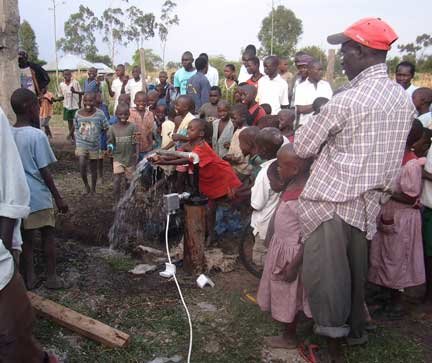 The villagers gather around as the well is run for the first time. Photo courtesy Earth Crafter
The villagers gather around as the well is run for the first time. Photo courtesy Earth Crafter
When Mark Plummer and his son Shane were getting ready earlier this year to leave for Kenya to install a septic system for an orphanage, they were prepared for the unknown. The two Key Pen residents knew all work in the village was done with hand tools and getting materials was far removed from the American experience of a quick trip to the hardware store.
The two were part of a group that traveled to Kenya this summer; many group members were from Hawaii, others from Washington state. Part of the group focused on the sanitation project at an orphanage school in the village of Kapiyo, while others taught or provided medical help.
Mark, who owns Vaughn-based site development and construction company Earth Crafters Inc., and Shane, who works for his father, told the KP News before leaving that their job while in Kenya would be to improvise. But they weren’t quite prepared for the news their group received upon arrival: The well system they thought had been hooked up was not.
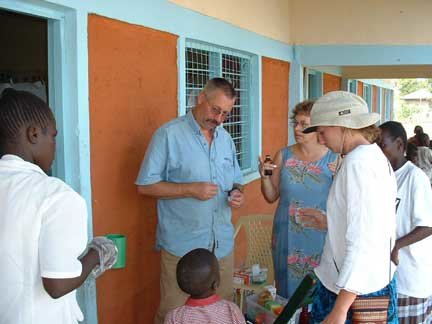 Members of the group, including Mark Plummer, give children ringworm medicine. Photo courtesy Earth Crafters
Members of the group, including Mark Plummer, give children ringworm medicine. Photo courtesy Earth Crafters
Shifting gears, their first step was to raise about $5,000 on the spot in order to buy a well pump, parts, and a generator (the power company wanted $10,000 to bring electricity to the village, so they opted for the generator). The task was achieved by calling back home to raise funds, and by members of the humanitarian team donating their own money.
“We worked like madmen to hook up the pumps,” Shane Plummer said.
Finding the extra funds was maybe the easiest part. “No materials except the word ‘pipe’ are the same,” said Don Burlingame, a Port Orchard resident who got his friend Mark Plummer involved in the trip.
Burlingame, who works in Hawaii, had visited the village the year before to help build the orphanage and work on the well system. The village uses contaminated water sources for their drinking water, has no electricity or sanitation, and no regular source of income.
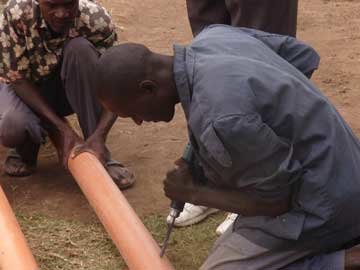 Power tools have never been used in the village; this worker uses the power drill for a long time. Photo courtesy Earth Crafters
Power tools have never been used in the village; this worker uses the power drill for a long time. Photo courtesy Earth Crafters
Although that trip was a success, Burlingame saw a much greater need for continuous involvement, and planned to return to build the septic system, and eventually hopes to see a medical facility there.
“The need is beyond your imagination,” he said.
Everything was done by hand —including crushing rock to make gravel and digging the ditches for the holding tank; the dump truck was a flatbed truck where the workers “shoveled in and out.”
To find the needed parts for the well hookup and septic, Burlingame spent several days shopping for many hours. Bartering is a big part of the African culture that helps build relationships —which in Kenya take priority over work, schedules and other elements that drive the American culture. When all else failed, the local workers hired for the group had to make materials.
“Here, you buy (pipe) connectors; there, you make the connectors,” Mark Plummer said.
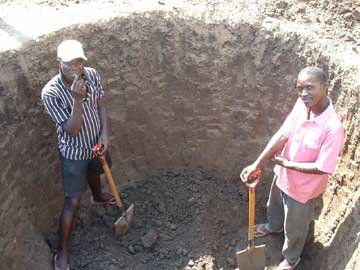 The hole for the septic tank, dug with shovels, is nearly complete. Photo courtesy Earth Crafters
The hole for the septic tank, dug with shovels, is nearly complete. Photo courtesy Earth Crafters
The American team hired one or two dozen locals each day, at $5 per day (much higher than average wage) to work on the project, which also brought a much-needed cash influx into the village.
It may be difficult to imagine how the group pulled it off, but the most unbelievable part was what happened when the water started to run.
“(The running water) was the happiest moment in the village,” Shane said. Women broke into dancing and singing; people came all night long with buckets, and kids skipped school to get water — causing the well to be closed during the school day. A big celebration involved six hours worth of speeches and a feast that included the butchering of two bulls, four goats, and two sheep, with about 3,000 people coming to the orphanage on foot from as far as 10 miles away. The orphanage was the first in the village of more than 30,000 residents to have electricity. The 2,500-gallon water tank is large enough to supply water for the entire village, and a spigot was installed outside the compound that is controlled from the inside.
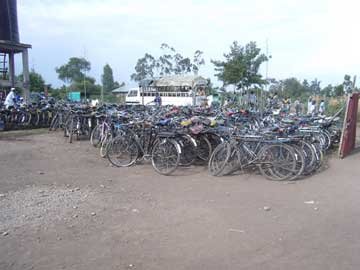 Hundreds of bikes are neatly parked after villagers came from miles away to celebrate the village’s first running water line. Photo courtesy Earth Crafters
Hundreds of bikes are neatly parked after villagers came from miles away to celebrate the village’s first running water line. Photo courtesy Earth Crafters
The group returned to the United States at the end of July after two and a half weeks. Although it took a few days to “get back to reality” and “our way of life,” one thing they knew right away: They would need to go back. The septic system, which was installed, still needs to be hooked up, and much more work can be done to help the village. They envision setting up education programs, and some villagers have expressed interest in learning entrepreneurial skills.
The group is working closely with Fred Outa, a Kenyan orphan raised and educated by American missionaries. Outa has returned to Kapiyo, and has been the driving force to help bring a better life to his native village. The orphanage is one of his projects. Once the American team builds a planned bathhouse, Outa will teach the children showering and personal hygiene, a habit that is not part of their culture.
“Fred’s concept is that every time you try to teach something anti-cultural like sanitation, the best way to do it is through the young people,” Mark said.
The goal is to take another small team to the village in February, if enough funds are raised. “There are plenty of things to do,” Shane said. “We hope to make it ongoing.”
UNDERWRITTEN BY THE FUND FOR NONPROFIT NEWS (NEWSMATCH) AT THE MIAMI FOUNDATION, THE ANGEL GUILD, ADVERTISERS, DONORS AND PEOPLE WHO SUPPORT INDEPENDENT, NONPROFIT LOCAL NEWS